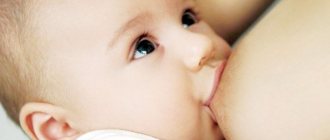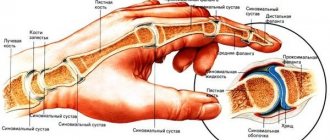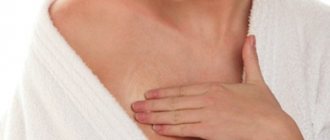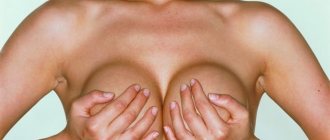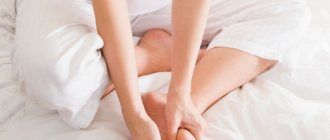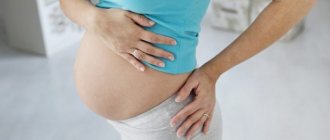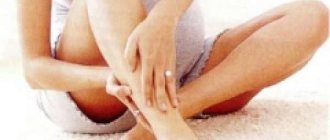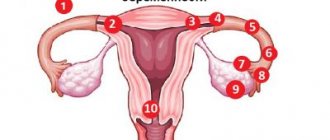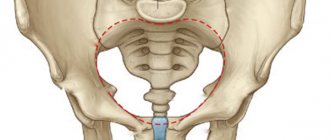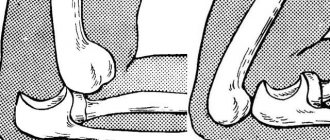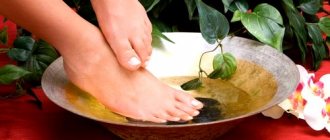What explains the pain in girls?
Breasts and nipples hurt in the majority of cases due to hormonal changes in a woman’s body, which are cyclical in nature.
It is important to know what symptoms you should immediately consult a doctor to avoid the development of serious diseases. Particular attention should be paid to the nature of chest pain, intensity and regularity. Natural physiological causes of pain are:
- PMS;
- conception;
- gestation period;
- stressful conditions;
- hormonal changes or disturbances;
- lung diseases, osteochondrosis, vegetative-vascular dystonia;
- taking hormonal drugs.
If the breast and nipple hurt for a long time, the symptoms may indicate the development of pathological processes or the presence of diseases. The following can cause pain:
- hormonal disbalance,
- mastopathy,
- lactostasis,
- cyst,
- breast cancer
One breast hurts
Experts do not recommend ignoring the sign when the breast and nipple hurt on only one side. The condition may signal candidiasis, the development of mastopathy, neuralgia or neoplasms.
Dislocation of pain in only one breast is an alarming symptom that requires consultation with a mammologist and, if necessary, laboratory diagnostics. The breast and nipple hurt on one side also when the baby is not fed correctly. You should perform proper application, avoiding awkward positions.
Initially, a thorough inspection at home should be performed. If your breast hurts when you press on the nipple, you will need to determine the cause of the unpleasant symptom.
The aching nature of the pain, as in the presence of a bruise, indicates a circulatory disorder. Unpleasant sensations arise from wearing uncomfortable, tight underwear. Stagnation of lymph occurs, causing inflammation and growth of tumors.
The chest and nipple hurt on the side, below due to neuralgia, inflammatory processes in the lungs or after injury to the chest. The symptom may also indicate pathological diseases of the internal organs.
Unpleasant sensations can radiate under the chest, not having anything to do with breast diseases. Experts do not recommend ignoring pain and tingling in order to avoid worsening the disease.
Breast enlargement can occur cyclically, before menstruation, or during gestation. Pharmacy products in the form of creams and ointments will help eliminate pain and alleviate the condition. After the birth of the child, the hormonal levels return to normal, the discomfort disappears.
Symptoms of discomfort in the lower abdomen and painful sensitivity of the mammary glands indicate pregnancy. Fullness of the uterus provokes pulling pains and increased blood circulation. Nipple hypersensitivity disappears in the second trimester of gestation and does not require special treatment.
The chest and nipple hurt in combination with elevated body temperature in the presence of an infectious pathology. Mastitis often affects the mammary glands during breastfeeding (during lactation).
The infection develops in areas where the skin is damaged. Symptoms of the disease are pronounced: acute pain, purulent discharge from the nipples, swelling. An increase in body temperature signals the development of an acute inflammatory process.
The disease can develop through three stages:
- initial (swelling, pain when touched);
- after 10-15 years (intense pain, gland density increases during PMS);
- final (formation of cysts; upon palpation of the nipple, pathological contents are released).
There is general weakness, migraines, and malaise. The signs of mastitis are very similar to the symptoms of infectious diseases. Timely and correct treatment will help quickly eliminate the disease. Diagnostics involves examination by a doctor and laboratory tests to determine the type of infectious pathogen.
Mastopathy
A common cause of diffuse or nodular mastopathy is hormonal imbalance.
Conservative treatment of mastopathy at the initial stage allows you to completely eliminate the pathology. Ignoring alarming symptoms can lead to complications and worsening of the condition due to the transformation of lumps into malignant tumors.
Girlish painful nipple syndrome does not require treatment. It is associated with a hormonal surge during puberty, then with the arrival of menstruation. A growing girl feels her breasts growing and the tubercles appear more sharply. These phenomena are accompanied by minor discomfort that does not require treatment.
Before menstruation, soreness, swelling, and redness of the nipples also appear, but this is not a pathology. This is how the mammary glands react to hormonal synthesis. As soon as the release of hormones calms down, the unpleasant sensations weaken and disappear. If the pain in the nipples becomes constant, it hurts severely, you need to seek help from a doctor.
Nipples hurt when a woman is diagnosed with breast tumors. One of the symptoms of oncology is tightening of the right or left papilla. Cancer of the gland itself rarely causes pain in the nipples, but Paget's disease is an oncology that also affects the nipple tissue.
The following symptoms should cause concern in women:
- inversion or flattening of the nipple;
- bloody or yellowish discharge;
- itching, lumbago, colic in the papillae;
- red color of the surrounding skin, areola.
If you notice such signs, consult a doctor immediately. You need urgent cell testing for mutation.
The conditions for the formation of soreness in the nipples are diseases of the mammary glands - mastopathy, mastitis. The first disease is characterized by the formation of nodules and the growth of connective tissue. The second is an inflammatory process of infectious etiology. With mastopathy, the chest hurts just like before the onset of menstruation, but the intensity of the sensation increases every month. The presence of fibrous nodules can be determined by palpation, ultrasound, or mammography.
Mastitis goes away painfully on its own. The breasts become heavy, deformed, red, and painful to touch. The pain syndrome is strong and sharp, the temperature rises, the tension of the nipple increases the pain. If measures are not taken to eliminate inflammation, suppuration and an abscess are possible. Treatment is therapeutic anti-inflammatory and surgical - removal of lesions.
Dermatological diseases can cause discomfort in and around the nipples.
Manifestations of papillary skin infections are expressed by a whole list of pathological changes:
- for eczema - itching, burning pain, blisters, redness, weeping areas, crusts;
- with candidiasis - swelling, inflammation, cracks, blisters;
- with herpes - redness, blisters with liquid, pain, itching, crusts;
- with impetigo - itching, redness, pain in the area of the formed pustules.
Which doctor should I contact?
In all cases of discomfort in the mammary glands, you should visit a gynecologist. The doctor will conduct an initial examination of the areas of concern and, if necessary, refer you to an appointment with a mammologist. In case of illness, the main part of the therapy is carried out by a specialist of this particular profile. If it turns out that the discomfort is associated with intolerance to certain substances, you will need to visit an allergist.
When the deterioration in health is due to the development of cancer, the woman is referred to an oncologist. If your nipples hurt due to atopic dermatitis, treatment is prescribed by a dermatologist. When a woman is diagnosed with a hormonal imbalance, the scope of therapeutic intervention is determined by an endocrinologist or gynecologist. It depends on the type of disorder and which gland provoked it - genital or other.
Choose a specialist, read reviews and make an appointment with a gynecologist online
At the first signs of a disorder, it is recommended to consult an orthopedist. The doctor will conduct a comprehensive diagnosis. If necessary, refer the patient to specialists in related specialties: chiropractor, traumatologist, surgeon. If functional disorders of the internal organs are detected, the patient will be referred for consultation to a pulmonologist, cardiologist, gastroenterologist for an ECG, ultrasound diagnostics and other studies recommended by the doctor.
As a rule, nipple pain is a temporary and harmless phenomenon. However, it doesn’t hurt to be on the safe side, especially if the pain is accompanied by unusual tissue changes and
Be vigilant and take care of your health!
Konstantin Mokanov: Master of Pharmacy and professional medical translator
Pain and the menstrual cycle in women
Girls and women know that a few days before the onset of menstrual bleeding, hormonal changes occur in the body, triggering the beginning of a new cycle.
Among the symptoms of premenstrual syndrome, along with irritability, tearfulness, and fatigue, there are also physiological manifestations. One of the most striking symptoms is swollen breasts and sensitive nipples.
On the eve of menstruation, the concentration of female sex hormones – prolactin and progesterone – increases significantly in the blood. A “cocktail” of hormones and biologically active substances leads to water retention in the body. The mammary glands are no exception; it is excess fluid that causes slight swelling of the breasts.
The expansion of the mammary ducts causes compression of the nerve endings. Hence the unpleasant sensations, increased sensitivity, pain. Before your period, touching your breasts causes irritation, and your usual underwear becomes uncomfortable. Pain before menstruation is considered normal; after menstruation, everything goes away until the start of the next cycle.
Ovulation
Unpleasant painful sensations in the chest may appear in the middle of the cycle. They are not as pronounced as before menstruation, so not all women pay attention to them. The peak occurs in the middle of the cycle - ovulation, the moment the egg matures and is released from the ovary.
Women with a stable cycle can track ovulation and correct a possible pregnancy.
During pregnancy
One of the earliest signs of pregnancy is nipple swelling and increased sensitivity.
Hormonal changes in the body are aimed at preparing the mammary glands for lactation.
As a rule, nipples become very sore and swollen in the first trimester. At the end of this period, the body copes with hormonal changes and the manifestations become less clear.
Lactation
The reasons why nipples hurt during breastfeeding are different:
- During feeding, a significant increase in size of the mammary glands occurs due to milk production. The flow of milk can cause pain in the breasts and nipples;
- The baby does not latch onto the nipple correctly. As a result, the skin of the nipples and areolas around them cracks, becomes rough and painful. In advanced cases, serious problems with the mother's health may arise;
- Nipples can become injured and sore in cases where the skin on them is too thin (dry), as well as if the nipple has an anatomically irregular shape (flat, sunken, long);
- Pain can be a harbinger of incipient inflammation, mastitis
Along with physiological changes that are normal for the female body during certain phases of the cycle, pain in the nipple area can signal the onset of a serious illness.
1. Benign or malignant neoplasms. Additional symptoms to watch out for are:
- Highlights when pressed
- Changes in the color of the nipple, areola, and their shape
- Pain in one of the mammary glands, which radiates to the armpit
- When examining the mammary gland with your hands, dense formations and nodules are clearly felt in it
The listed symptoms are a reason to visit a mammologist and undergo a comprehensive examination. Neoplasms in the initial stages can be treated, even with preservation of the gland or its partial resection.
2. Endocrine disorders caused by malfunction of the thyroid gland, pituitary gland, liver, and adrenal glands.
3. Intercostal neuralgia can manifest itself in a similar way in both men and women.
4. Psychological problems, stress, severe mental overload also lead to hormonal imbalances and can provoke increased sensitivity of the nipples.
Some women, having chosen to protect themselves from unwanted pregnancy with the help of oral contraceptives, notice that their nipples swell, itch, and hurt, regardless of the phase of the cycle.
A similar side effect is indicated in the annotation for many OCs. If the sensations cause severe discomfort, then it is worth discussing with the gynecologist the replacement of one drug with another.
Periodically recurring soreness of the nipples in women is called mastodynia. It is caused by cyclical changes occurring in the uterus and appendages. The body prepares for fertilization every month, a large amount of progesterone and prolactin is produced, the mammary glands react to hormonal release in a unique way:
- two days before menstruation, the breasts begin to swell;
- when touched, sensitivity increases;
- the nipple swells and becomes rough;
- These processes are accompanied by painful sensations.
Some ladies experience mastodynia during ovulation. The onset of menstruation relieves the syndrome; as the bleeding subsides, it disappears completely. When women have nipple pain, the reasons are unknown, it is not recommended to postpone a visit to the gynecologist, since the pain may be a sign of hormonal dysfunction caused by diseases of the adrenal glands and thyroid gland.
The secretory background, as the cause of the unfavorable condition of the nipples, may be disrupted:
- due to taking contraceptives, if there was an error in the selection of drugs;
- with nervous overstrain;
- with prolonged sexual abstinence;
- during pregnancy.
These causes of mastodynia are not associated with pathologies. Don’t tolerate it if you are in pain, be attentive to your condition. Find out the reason why your nipples hurt, replace contraceptives, and beware of stress. If you experience pathological symptoms, consult your doctor.
Breastfeeding turns into a painful process for many mothers. The reason is that the nipples are very painful and bleed. This happens when expectant mothers do not prepare their breasts for feeding or massage their nipples. The condition for the appearance of cracks is the child’s improper latching on the breast. The papilla should be completely in the baby's mouth.
An erroneous sucking technique is when the nipple is located near the gum during feeding and rubs against the hard palate. It is necessary to immediately use the deep grip method - in the back of the mouth. The newborn's lips should cover part of the areola. If your right nipple is larger than the left (or vice versa), then take this into account when feeding, carefully watch how deeply the baby grasps it.
Picture 5 Correct latching of the nipple by a baby
A young mother needs to choose the right breast pump. The funnel should be suitable for the size of the breast, the suction force of the device should be moderate. When a baby teethes, he fixes the nipple in his mouth differently. The mother's job is to give the breast as deep into the baby's mouth as possible. You will understand why to do this as soon as your baby bites you on the nipple and damages the delicate tissue.
Pressing the papilla to the gum by the baby causes, in addition to friction, a restriction of blood flow, which contributes to vasospasm. This excessive compression explains why the nipples become very red and sore.
One breast hurts
Mastodynia, which has a cyclical nature
This is a disease in which the patient experiences discomfort in the area of the mammary glands. As a rule, this condition is explained by hormonal imbalances. However, other factors can also trigger its appearance. These are multiple interruptions of the pregnancy process, surgical interventions, depression, emotional stress, inflammatory pathologies, injuries.
Signs of mastodynia include:
- Feeling of heaviness in the area of the mammary glands.
- Increase in the size of these organs.
- The presence of discomfort that has a pulling character.
- Increased sensitivity of the nipples.
- Pain when touched.
Mastodynia is usually a bilateral pathological process. In this condition, discomfort becomes especially pronounced during menstruation. In addition, after menstruation, the nipples hurt and the mammary glands become swollen. Patients notice increased nervousness and irritability.
Why can boys' nipples hurt?
Teenage boys in adolescence experience pain in the nipple area similar to that of girls. This happens for various reasons:
- Hormonal changes in the body associated with puberty;
- Allergies to hygiene items, linen;
- Bruises, chest injuries;
- Endocrine disorders - diseases of the pituitary gland, testicles, adrenal glands. These glands are involved in the production of male hormones. Their deficiency leads to disruption of the formation of secondary sexual characteristics;
- Gynecomastia is breast enlargement in boys. It occurs either as a result of excess body weight (obesity), or as a result of hormonal disorders, a lack of male hormones and an excess of female ones;
- Breast cancer is accompanied by discharge from the nipples and changes in the structure of the gland;
- Diabetes
Other factors causing discomfort
There are several other reasons that cause pain in the mammary glands. These include:
- Changes in climatic conditions. This is especially true for situations when women living in the north leave for the purpose of vacation to the south. If they use an airplane as a means of transport, the likelihood of hormonal imbalance increases. Changing time zones causes a delay in menstruation and discomfort in the chest area.
- A sharp decrease in body weight, gain of excess kilograms, metabolic disorders.
- Emotional stress.
- Irregular intimate contacts.
- Pathologies of the vertebral discs.
- Diseases of the gonads.
- Malfunctions of the endocrine system.
- Inflammation in the lymph nodes.
- Ringworm of a shingles nature.
What to do if your nipples hurt?
Preventive measures include maintaining a healthy lifestyle and regular visits to specialists.
To ease the condition when your breasts and nipples hurt, simple recommendations will help:
- Consultation at a medical facility. Severe pain indicates the need to visit a specialist. It is important to promptly identify the cause of pain and obtain an adequate prescription from a doctor. The problem can only be eliminated by treating the disease, not eliminating the symptoms.
- Minimize irritating factors. It is not recommended to provoke pain by constantly touching the mammary glands. Additionally, you should purchase comfortable seamless underwear made from natural fabrics.
- Compliance with care and hygiene rules. Complete moisturizing, softening and massage will help relieve dry skin, cracked nipples and stretch marks. It is better to carry out hygiene procedures without soap, lubricating the nipples with sea buckthorn oil after bathing.
The breasts and nipples hurt with increasing intensity only with pathology. Discharge from the breast, changes in the shape of the nipple, the appearance of erosions and swelling are dangerous symptoms that require immediate medical attention.
First of all, you need to find out what the cause of the pain is. If they are caused by the onset of a certain phase of the cycle, then at this time you should avoid breast stimulation, overstimulation, and limit possible touching as much as possible.
- A cool shower helps reduce pain.
- Lingerie should be comfortable, convenient, appropriate size, made from natural materials. It is better to give preference to seamless models
- Soap and shower gel dry out the skin, so you should not overuse them. After a shower, you should use special softening body creams
- A nursing mother should learn how to properly attach her baby to the breast. If your nipples are of irregular shape, you can purchase special shields that make the feeding process comfortable and painless.
When is it time to sound the alarm?
If pregnancy has not occurred, your period has ended, and the sensitivity of your nipples has not decreased, touching them causes pain and discomfort, you should pay attention to other symptoms:
- Change in color, shape of nipples, areolas; significant deformation of the breast shape
- Purulent or bloody nipple discharge
- The appearance of cracks, wounds, ulcers, swelling
- Increased pain
A consultation with a specialist will help you get an answer to the question of why your nipples swell and hurt, and choose methods to eliminate it.
You have already understood that the causes of pain can be different, you should not immediately sound the alarm, but it is also not good to let things take their course. Knowing what to pay attention to, a woman will not miss the onset of a serious illness and will have time to take the necessary measures.
Reason #3: allergies or atopic dermatitis
Pain and irritation of the nipples, accompanied by peeling and blistering of the skin, may be a sign of an allergic reaction or atopic dermatitis (eczema).
Among household products, allergies are provoked by:
• soap • body lotion • washing powder • fabric conditioner • shaving cream • new clothes • perfumes
If allergies occur, exclude suspicious fabrics, cosmetics and perfumes, use antiallergic ointment (fenistil) and antihistamines in tablets (cetirizine, loratadine). If the rash, pain and itching do not go away, consult a specialist.
Painful nipple syndrome in expectant mothers
Why nipples hurt in pregnant women is a question that causes concern and affects the stability of the psychological state. It is important for those who are carrying a child to know how pain will affect the productivity of the mammary glands, the baby, and the general well-being of the expectant mother.
- Swelling and tingling in the papillae begins in the early stages of pregnancy. From the moment of conception, the body begins to prepare for lactation, the process is accompanied by painful sensations.
- Lumps appear around the papillae, which can also be sensitive to the touch.
- The nipple itself may hurt, as well as the darkened areola.
How to solve the problem, treatment methods
Knowing how to treat sore nipples will help you get rid of trouble and pain.
- The use of nipple covers when feeding if there is an anatomical defect in the structure, for example, with retraction.
- Refusal of hard tugging at the final stage of breastfeeding.
- It is necessary to monitor excess milk accumulation and express in case of lactostasis.
- Careful breast hygiene and the use of recommended procedures for the formation of cracks and other damage are required.
Every woman knows why it is necessary to wash her breasts; it should be recalled that treating the papillae after feeding is also an important point. If you don't have cracks, don't wipe away drops of milk after feeding, this will act as natural lubrication. If there is damage, use sea buckthorn oil, Solcoseryl, Bepanten, Purelan ointments.
Wearing a comfortable bra is important. It should be made of cotton fabric and have pads to absorb drops of milk.
